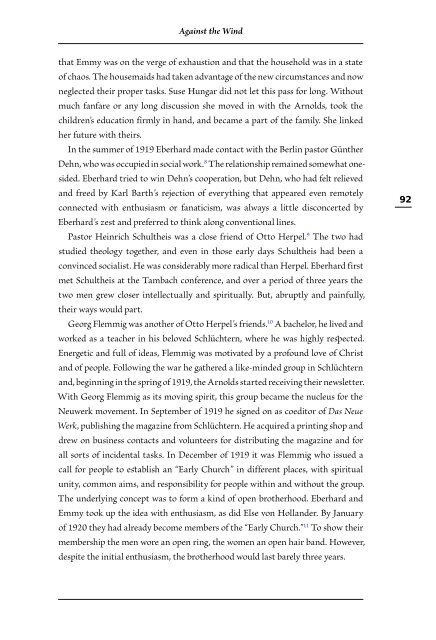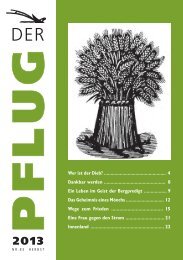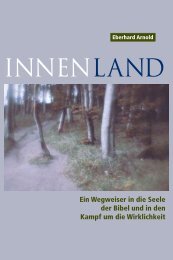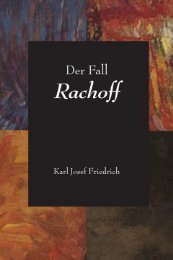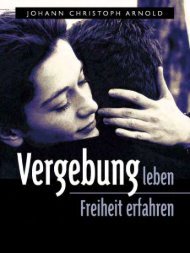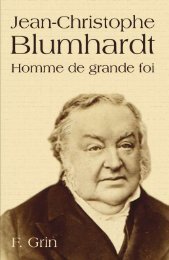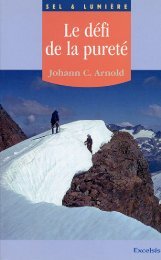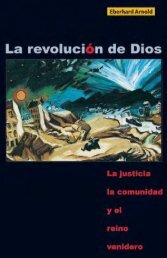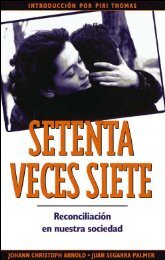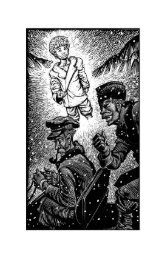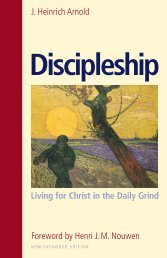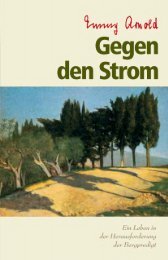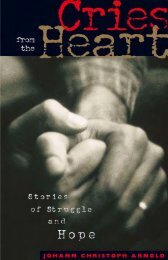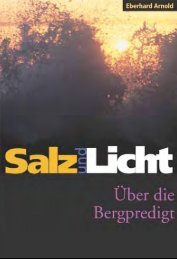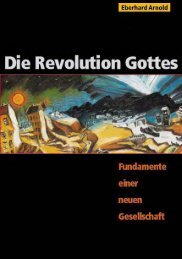Against the Wind: Eberhard Arnold and the Bruderhof - Plough
Against the Wind: Eberhard Arnold and the Bruderhof - Plough
Against the Wind: Eberhard Arnold and the Bruderhof - Plough
You also want an ePaper? Increase the reach of your titles
YUMPU automatically turns print PDFs into web optimized ePapers that Google loves.
<strong>Against</strong> <strong>the</strong> <strong>Wind</strong><br />
that Emmy was on <strong>the</strong> verge of exhaustion <strong>and</strong> that <strong>the</strong> household was in a state<br />
of chaos. The housemaids had taken advantage of <strong>the</strong> new circumstances <strong>and</strong> now<br />
neglected <strong>the</strong>ir proper tasks. Suse Hungar did not let this pass for long. Without<br />
much fanfare or any long discussion she moved in with <strong>the</strong> <strong>Arnold</strong>s, took <strong>the</strong><br />
children’s education firmly in h<strong>and</strong>, <strong>and</strong> became a part of <strong>the</strong> family. She linked<br />
her future with <strong>the</strong>irs.<br />
In <strong>the</strong> summer of 1919 <strong>Eberhard</strong> made contact with <strong>the</strong> Berlin pastor Gün<strong>the</strong>r<br />
Dehn, who was occupied in social work. 8 The relationship remained somewhat one-<br />
sided. <strong>Eberhard</strong> tried to win Dehn’s cooperation, but Dehn, who had felt relieved<br />
<strong>and</strong> freed by Karl Barth’s rejection of everything that appeared even remotely<br />
connected with enthusiasm or fanaticism, was always a little disconcerted by<br />
<strong>Eberhard</strong>’s zest <strong>and</strong> preferred to think along conventional lines.<br />
Pastor Heinrich Schul<strong>the</strong>is was a close friend of Otto Herpel. 9 The two had<br />
studied <strong>the</strong>ology toge<strong>the</strong>r, <strong>and</strong> even in those early days Schul<strong>the</strong>is had been a<br />
convinced socialist. He was considerably more radical than Herpel. <strong>Eberhard</strong> first<br />
met Schul<strong>the</strong>is at <strong>the</strong> Tambach conference, <strong>and</strong> over a period of three years <strong>the</strong><br />
two men grew closer intellectually <strong>and</strong> spiritually. But, abruptly <strong>and</strong> painfully,<br />
<strong>the</strong>ir ways would part.<br />
Georg Flemmig was ano<strong>the</strong>r of Otto Herpel’s friends. 10 A bachelor, he lived <strong>and</strong><br />
worked as a teacher in his beloved Schlüchtern, where he was highly resected.<br />
Energetic <strong>and</strong> full of ideas, Flemmig was motivated by a profound love of Christ<br />
<strong>and</strong> of people. Following <strong>the</strong> war he ga<strong>the</strong>red a like-minded group in Schlüchtern<br />
<strong>and</strong>, beginning in <strong>the</strong> spring of 1919, <strong>the</strong> <strong>Arnold</strong>s started receiving <strong>the</strong>ir newsletter.<br />
With Georg Flemmig as its moving spirit, this group became <strong>the</strong> nucleus for <strong>the</strong><br />
Neuwerk movement. In September of 1919 he signed on as coeditor of Das Neue<br />
Werk, publishing <strong>the</strong> magazine from Schlüchtern. He acquired a printing shop <strong>and</strong><br />
drew on business contacts <strong>and</strong> volunteers for distributing <strong>the</strong> magazine <strong>and</strong> for<br />
all sorts of incidental tasks. In December of 1919 it was Flemmig who issued a<br />
call for people to esablish an “Early Church” in different places, with spiritual<br />
unity, common aims, <strong>and</strong> responsibility for people within <strong>and</strong> without <strong>the</strong> group.<br />
The underlying concept was to form a kind of open bro<strong>the</strong>rhood. <strong>Eberhard</strong> <strong>and</strong><br />
Emmy took up <strong>the</strong> idea with enthusiasm, as did Else von Holl<strong>and</strong>er. By January<br />
of 1920 <strong>the</strong>y had already become members of <strong>the</strong> “Early Church.” 11 To show <strong>the</strong>ir<br />
membership <strong>the</strong> men wore an open ring, <strong>the</strong> women an open hair b<strong>and</strong>. However,<br />
despite <strong>the</strong> initial enthusiasm, <strong>the</strong> bro<strong>the</strong>rhood would last barely three years.<br />
92


